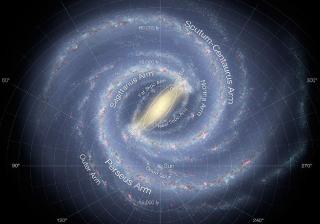Bibcode
Beronya, D. M.; Karpova, A. V.; Kirichenko, A. Yu; Zharikov, S. V.; Zyuzin, D. A.; Shibanov, Yu A.; Cabrera-Lavers, A.
Bibliographical reference
Monthly Notices of the Royal Astronomical Society, Volume 485, Issue 3, p.3715-3720
Advertised on:
5
2019
Citations
14
Refereed citations
13
Description
We report detection of the likely companion of the binary millisecond
pulsar (MSP) J0740+6620 with the Gran Telescopio Canarias in the r' and
i' bands. The position of the detected starlike source coincides with
the pulsar coordinates within the 1σ uncertainty of ≈0.2
arcsec. Its magnitudes are r' = 26.51 ± 0.17 and i' = 25.49
± 0.15. Comparing the data with the white dwarf (WD) cooling
tracks suggests that it can be an ultracool helium-atmosphere WD with
the temperature ≲3500 K and cooling age ≳5 Gyr. The age is
consistent with the pulsar characteristic age corrected for kinematic
effects. This is the reddest source among known WD companions of MSPs.
Detection of the source in other bands would be useful to clarify its
properties and nature.
Related projects

Morphology and dynamics of the Milky Way
This project consists of two parts, each differentiated but both complementary: morphology and dynamics. Detailed study of the morphology of the Milky Way pretends to provide a data base for the stellar distribution in the most remote and heavily obscured regions of our Galaxy, through the development of semiempirical models based on the
Martín
López Corredoira